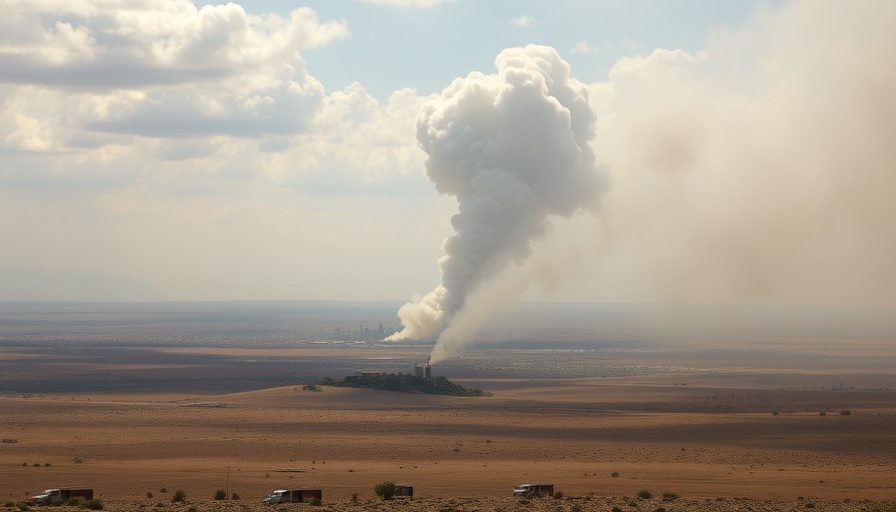
A Global Response to Military Expansion in Gaza
The leaders of Canada, the United Kingdom, and France have united in a firm stance against Israel's expanding military actions in Gaza and the West Bank, issuing a compelling joint statement that threatens "concrete actions" including potential sanctions if these actions do not cease. This unprecedented level of political condemnation emphasizes the urgency with which these nations perceive the Israeli government's recent escalations, especially following Prime Minister Benjamin Netanyahu's announcements regarding intensified military operations and humanitarian restrictions.
Understanding the Context: Why Now?
Israel's military maneuvers come in the wake of the dramatic events of October 7, 2023, when Hamas launched attacks that left Israel reeling. In striving for security by pressuring Hamas to release retained hostages, the Israeli government has responded militarily with air and ground operations that have drawn international ire. The joint statement by Canada, the U.K., and France acknowledges Israel's right to defend itself against terrorism but notes that its current actions are disproportionate and result in excessive human suffering.
The Leaders’ Collective Statement
The declaration that they "will not stand by" sharply indicates a growing frustration among these nations regarding Israel’s military strategies. "The level of human suffering in Gaza is intolerable," they stated, labeling the recent announcement regarding humanitarian aid inadequate. Their unified front signifies a shift towards more assertive foreign policy measures, an indication that diplomatic patience may be wearing thin.
Humanitarian Crisis: More Than Just Politics
The humanitarian impact of the military expansion is staggering and deserving of attention. Recently, reports from NGOs and international monitoring agencies reveal that access to food, medical supplies, and safe shelter for Gazans remains critically limited. Emphasizing this plight, Canada, the U.K., and France suggest that failure to lift humanitarian restrictions may trigger direct international consequences. The discourse is increasingly shifting from political statements to actionable plans aimed at alleviating the Gaza crisis.
Historical Implications of Intervention
This situation unfolds against a backdrop of historical Western involvement in Middle Eastern affairs, particularly concerning Israeli-Palestinian dynamics. Previous interventions have sometimes resulted in unintended consequences. Thus, the proposed measures by these three nations need to balance between addressing human rights and ensuring regional stability.
Global Reactions: The Challenge Ahead
The international community is keenly observing how these threats may translate into real-world actions. While the three countries have committed to a course of action, the complexity of international relations, especially in the Middle East, makes predictions difficult. Nations across the globe will weigh in, with some expressing support for interventions, while others caution against escalating tensions further.
Public Sentiment: A Dual Perspective
The public's reaction to Israel's military expansion and the subsequent international response is mixed. Many citizens in the U.K., Canada, and France support their governments taking a firmer stance against perceived injustice in Gaza. Meanwhile, diverse opinions exist about the appropriateness and effectiveness of imposing sanctions or other measures against Israel. This divergence highlights a deep-rooted concern for human rights alongside a commitment to secure the geopolitical interests tied to Israel.
Future Prognosis: What Comes Next?
As the situation unfolds, the hope remains that diplomatic interventions will lead to de-escalation. Predictive analyses suggest that if military actions continue unchecked, relations between Israel and Western allies may come under increasing strain. Sanctions could result in shifts in alliances in the region and beyond, raising questions about the long-term viability of such actions.
Conclusion: The Need for a Nuanced Approach
In a complex and evolving landscape, the response from Canada, the U.K., and France reflects their commitment to uphold human rights across the globe, while also navigating the intricacies of international diplomacy. Observers and citizens alike await the execution of their stated plans, recognizing that the path forward demands not only decisive action, but also thoughtful engagement with the ongoing humanitarian crisis in Gaza. We need to continue advocating for peace and understanding, making our voices heard regarding the need for effective solutions.
 Add Row
Add Row  Add
Add 




 Add Row
Add Row  Add
Add 

Write A Comment